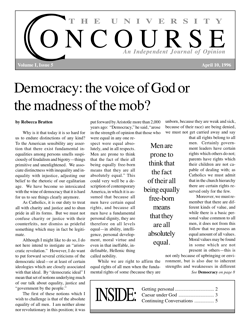Core curriculum and critical thinking
by Joseph A. Loizzo
Dr. Crosby’s article on the core curriculum at FUS (in the February 13 issue) has given me much “food for thought” on a related subject: the fostering of what I will call critical thinking skills or the ability to analyze new knowledge and integrate it into one’s life. A dictionary definition of the terms “analyze” and “integrate” indicates that these basic cognitive functions are essential for a liberal arts education which seeks to examine closely and critically new ideas, and then bring these ideas together and assimilate them for the individual. This process would involve the study of the new information or ideas in an effort to understand and to judge the merits for later integration and use.
However, these very critical thinking skills must proceed from a base of knowledge upon which to judge the relative merits of the new subject being studied. I believe this is what Dr. Crosby refers to as the “knowledge of first things” in the various disciplines or the courses that make up a genuine liberal arts education. Without such a base of information, how can the student apply the skills of analysis and integration of material into his or her life? The process of integrating new ideas involves examination of the material, linking it to previously learned material, and evaluating it in the light of truth and one’s beliefs—all of which presumes a knowledge base broad enough to compare this new information. Without this knowledge base one might either reject the new material upon a casual review or embrace it without adequate analysis and reflection.
It is easy for a student to select courses based on a pragmatic determination of a future career goal and miss out on the richness of a truly liberal arts education, which serves to inform and mold the mind and the person. I remember several courses required in the core curriculum at my alma mater, which seemed useless at the time, but which, in the end, not only formed the means of expanding my overall education, but also led me to question and eventually change my career choice. I don’t know if this would have been possible without the broad exposure my undergraduate education provided through the core curriculum.
There is another issue related to this discussion of fostering critical thinking skills. I wonder at times if our commitment to orthodoxy in teaching doesn’t blunt students’ ability to question, analyze and integrate knowledge, including even essential elements of our Catholic Faith and traditions. I believe such a commitment is essential, but how does a young adult at Franciscan University have the courage to question, analyze and hopefully integrate and “own” these matters of faith and belief? The attitude among some students I have known over the years here is expressed as judging anyone who questions or analyzes matters of faith and belief as being, at best, misguided or somehow not authentically Catholic, if not outright pagan. I exaggerate a bit in order to emphasize the point that the fostering of critical thinking skills is important in ways which go far beyond providing a well rounded education leading to one’s career choice. This type of analysis and integration is essential in the development of a healthy life of faith.
In a recent article entitled “Getting the Most Out of College,” William J. Bennett, former US Secretary of Education, argues that college students have different ideas about where they want a college degree to take them—law school, journalism, public service, etc. He acknowledges the validity of such pragmatic concerns, but he also believes every student should “take the time to tread the ground outside of his or her major, and to spend time in the company of the great travelers who have come before.” In other words, students should be exposed to a core curriculum which truly prepares them to think critically. Bennett goes on to say that if we take the time to study how men and women of the past dealt with life’s enduring problems, we will be better prepared when those same problems come our way.
In our consideration of the core curriculum we need to recognize that students who seek to learn how the enduring problems of life were handled by the great thinkers of the past will be better prepared to succeed in any endeavor they undertake, in all aspects of their personal lives and careers.
Joseph A. Loizzo, Director of Campus Counseling
Mr. Loizzo also teaches part time in the MA Counseling Program


